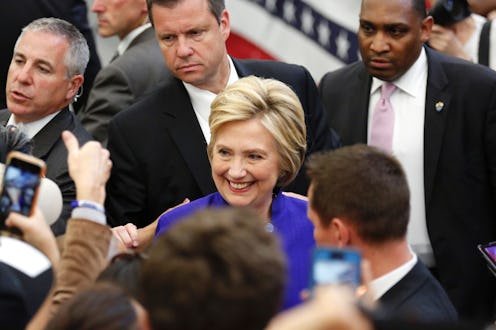After surveying the remaining unpledged delegates over the past seven months, the Associated Press determined that Hillary Clinton had gained enough superdelegates to push her count into Democratic nominee territory on Monday. With seven primaries left, however, the candidate is continuing to remind her supporters to visit the ballots. Though it's incredibly unlikely that Bernie Sanders will be able to succeed in convincing superdelegates to change their minds during a contested convention, Clinton is playing it safe. Furthermore, she's doing her best not to alienate Sanders' supporters, many of whom are already hostile toward the decades-old political machine that determines nominees.
Superdelegates, for reference, are not obligated to vote for the candidate who won the majority of his or her state. Instead, they can side with whomever they please. According to the AP, along with RealClearPolitics' delegate trackers, Clinton currently has 571 superdelegates in the bag (along with 1,812 pledged delegates). And though they're responsible for the early nomination announcement, they account for less than 24 percent of her total delegate count number, which has now reached the magic number: 2,383. In this election, superdelegates have proven to be incredibly beneficial to Clinton, but they have also sparked a feud that's managed to divide the nation's views on the nominee selection process. Most of the trouble stems from Sander's disproportionately low number of unpledged delegates.
If the ratio of superdelegate counts accurately reflected that of the pledged delegate count, Clinton would have just 337 superdelegates, as opposed to 571, and Sanders would have 282. Though there has been much fuss over the disparity, Clinton only needs to take 215 of the remaining 714 pledged delegates to win a majority of those pledged delegates and render her unpledged delegate lead superfluous. So far, it looks as though she'll attempt to legitimize her overall delegate count by doing this.
NPR reported that Clinton's campaign manager Robby Mook released a written statement, referring to the big announcement as a "milestone" but not a definite victory. As he suggests, only pledged delegate wins will ward off critics of the Democratic nominee announcement.
This is an important milestone, but there are six states that are voting Tuesday, with millions of people heading to the polls, and Hillary Clinton is working to earn every vote. We look forward to Tuesday night, when Hillary Clinton will clinch not only a win in the popular vote, but also the majority of pledged delegates.
Though she has superdelegates to thank for the early nomination, Clinton is hesitant to advertise her unpledged supporters. Most likely, she'll need Sanders' voters on her side to defeat presumptive Republican nominee Donald Trump in November.
